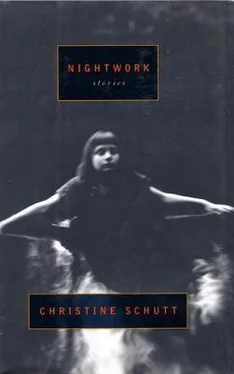But understand — there is this mother! The bath towels, old messages, Q-Tips, hair, the strewn ephemera of indoor living, the unguents for raspy skin, the mother’s rubbing in and rubbing in, telling such things that made the daughter wonder — and wonder was this natural, the parts of her the mother bent to? Shouldn’t a mother take her sorrow to someone else — to a husband, a lover — a man lying on the bed with his ankles crossed, saying, “Please me.” What did a daughter, untucked and scuffed, have to do with their pleasure?
“How awful,” she said.
“Hell,” the daughter said, angry or tired the way it sounded, almost swaggered, from a girl half-dressed in uniform. Saying, “I wrote that for my teacher”—a girl wetting her broken lips at her mother’s ear and saying, “This teacher loves me.”
BECAUSE I COULD NOT STOP FOR DEATH
More than any other, you belong here, but what is there to say but what I meant to say and never did? — not quite and perhaps not even here, and yet I write to you and see your same uneven hand, me older now than you when first we met, my teacher, the oddest-looking man — everyone said so. You were — what, in your thirties? — and worked up every day, spitting into the gullies of books and more books. They have made movies out of you, but the heroes have been handsome — hardly you. Impossible list of imperfections: no chin, moist, petulant lips.
Nora Gail Bryant said you touched her breasts in the cattle-stunned heat of a summer when she was learning words— ambiguous, augment, assess —to be the first one in her family to get away from where we all got away from, all but you. Come late enough, by choice, to the new school, where nothing was decided and the unstained wood in the rain flared yellow, you stayed, a pioneer, intrepid. Nora Gail said you—
Oh, we couldn’t ever quite believe it. A little tepee of a man — white lashes, goggly eyes — how could you?
I always meant to ask.
Besides, you had a wife then, though for years we did not see that faint-colored woman with a paintbrush at her ear; we were looking at you, you in the middle of the horseshoed tables, waving at us papers with messages in red, words extravagant or cruel. We could see the grades you said you forgot as soon as entered there.
Only the student, marked-upon, remembers.
I am at the end of the horseshoed table, nearest to the board and to you and to where it is you turn to write — in your upslant hand — how much has been said. We are writing poems, and even before the day is out, you are calling to me, “Yes!” You headlonging down the hall after me with the news you like it—“Yes!”
In school, such things can happen as change a life.
You failed me for what I failed to write on Ammons’s poem, saying, “So what, impromptu …” Your expression as you spoke to me was bewildered; you retreating to your Shakespeare: “You reason as a woman—‘I think him so because I think him so’ ”; you, a teacher, after all, leaning against the blackboard, fanny chalked. You yelled, “Defend yourself!” Names, titles — your readiness to speak made me clumsy, and I resented you and everyone else, pointing: Look! Look at what they do in my house. A morning newspaper. odd magazines; only to Mother do the books collect like string; all kinds, she isn’t choosy: hardbacks on the high shelves, but paperbacks mostly — bookmarked with her bobby pins or broken and swollen in the places she thinks to leave them.
I read then.
I read a lot. Mostly poets, men poets, not handsome in their photographs but glistening to please — a sweaty, open-collared pose, an appearance almost anxious, a little mad and full of yearning, a little — should I say it? — like you.
“ ‘So country-alone, and oh so very friendly,’ ” you quoted someone, forever old and unloved. “Of course, love,” you said when I was no longer your student. “What else but love and God and dying?” you asked. By then only drinking coffee, you sometimes trembled just to speak, and yet I made our dates in bars and pulled olives off toothpicks with my teeth. Conspicuously buckled — links, chains — I tunneled my hand through the gap in my shirt. You told me what you wanted. But I, who had given in to so many with no regard to after, guarded my sweet sex.
We met in places far enough away from where you taught, kept a wife, slushed through the streets after rice, milk, salt; besides, that life — shelves of soups and chipped plates and umbrellas crimping in the closet heat — was not real, no more than were the children, yours and mine. “Boy or girl?” you had to ask — and ask.
But so did I.
“Rousingly disillusioning” was how you said it had been for a lot of us, and you sent me your poems where the vaulted classroom flickered warm-wood red. Your sentiment surprised me; besides, it was not like that. The ceiling was low and perforated — I remember — and the classroom’s plastic surfaces, slouchy modern seats and rounded edges, table legs like cue sticks, hollow tubes of aluminum; I could lock my legs around them, writing furiously on whichever Conrad it was in the years I had you. You were interested in islands, you said; the sea, your mother. I sat through our dates, thinking of that classroom and of us here in the middle of the country, no ocean in sight. Dry-level treeless expanse, the same we looked out on and out on from wherever you were staying then, getting well, you said, getting better than ever. Coffee, coffee, coffee. You were warming your hands on the mitt of your cup, sniffing at the vapors, palely seen. You, sick this way, I could and could not believe it. “Really?” I said to every disclosure. “I’m amazed. I didn’t know.…” Didn’t want to know. Your hands were very pale. Your fingernails were yellow. It was easy to resist you, to say no to you when you asked if you might.
I did not treat you well.
I never told you … turned away in the moment when it happened, you shutting your mouth on the tablet of her words — Dickinson, the flood subject. Death.
Was he expected?
Were you in any way prepared?
The students gathered at your desk said you were teaching or had finished teaching the famous poem when it happened. But I am not acquainted with these students and cannot ask what it was they heard, children still. Yet every year I greet them, as you did on your Great Lawn, versions of the same faces.
I begin to know how old you were. Death, death apparent everywhere — and you dying too soon for us to talk about it.
The girls had their own versions, of course, which they told, calling her by his name for her, Margaret, saying, “Margaret, we knew your brother. He wasn’t bad.” Then what? she wondered, and Margaret came upon them again as she had come upon them. Long days, taking the washed streets home from work, Margaret had come upon them, the girls and her brother, bunched under the portico of the night-abandoned embassy, all shiny blacks and chains before a match, another match illumined their sprung faces — surprise! — or else they did not see her, and they argued. Margaret had heard their girl voices in the muffle of the huddle, asking, “Share, will you, please? I’m cold.” In the unhinged season this had been, already dark, when the wind off the river rolled barrels down the promenade and banged the padlocked gates of shut-up shops. “Coming home?” Margaret had asked him, and her brother had answered, rolling his shoulders to say, “I don’t want it — fuck off, you mother!”
The brother was a shrug, a glance, a long, stooped back, rough hair belted in notched garbage ties — and gone before he was gone: This was Margaret’s version. She told anyone at all about the resinous stains on his fingers, the slept-in folds of his shirts. The jeans he wore so long unwashed were oily with his dirt. No coat, no socks, shoes curled witchy and split at the seams, her brother at the lip of things — the door, the curb, the dock — was licking at the fogged face of his kiddie-face watch.
Читать дальше












